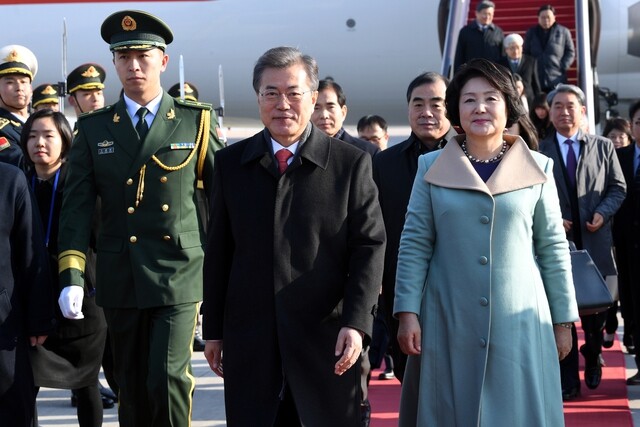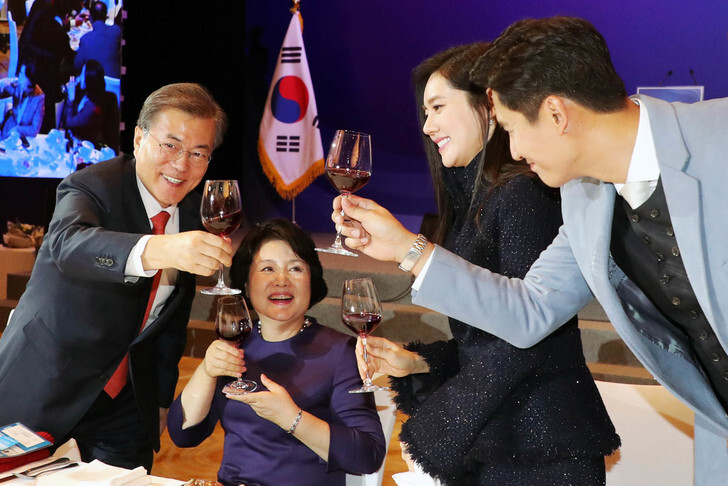hankyoreh
Links to other country sites 다른 나라 사이트 링크
President Moon takes aim at Japan in bid to improve China-South Korean relations

On Dec. 13, South Korean President Moon Jae-in, who is on a four-day state visit to China, put the spotlight on the painful history shared by the two countries as part of his attempt to restore bilateral relations between the two countries, which have been chilled by the conflict over THAAD. As it happened, this was the 80th anniversary of the Nanjing Massacre, a terrible tragedy in the modern history of China, which allowed Moon to mention the suffering the two countries have endured and their history of resisting the Japanese colonization at a number of events, including a meeting with South Koreans living in China.
“Our two countries endured the travails of imperialism together, and we passed through a difficult time together, as we struggled together against Japanese colonialism. We gained the friendship of the Chinese people, who became our comrades,” Moon said during a meeting with South Koreans based in China that was held at the Sofitel Wanda Hotel in Beijing on the afternoon of Dec. 13. After mentioning that the day was the 80th anniversary of the Nanjing Massacre, Moon said, “Koreans deeply identify with what the Chinese suffered.”
“Northeast Asia also needs to throw open the door of the future and the door of cooperation by adopting an attitude of squarely facing our history. In order to do that, there must be an effort to reflect upon the past and to heal the wounded,” Moon said in a South Korea-China business forum that was held afterward. Moon’s remarks were clearly aimed at Japan, based on South Korea and China’s shared interests.
The team of diplomats who had prepared for Moon’s visit to China initially hoped that he would not mention the Nanjing Massacre, out of concern that this might provoke Japan. But as Moon was reviewing the final draft three days before his trip, he asked the team to add a reference to the topic. He also instructed South Korean Ambassador to China Noh Young-min, who had been planning to greet Moon and his delegation at the Beijing Capital International Airport, to instead attend the memorial service for the 80th anniversary of the Nanjing Massacre, which was to be attended by a large number of China’s entire leadership, including Chinese President Xi Jinping.

“Since [the memorial service] is said to be an important national event in this country, our ambassador should be there to show his support,” Moon was quoted as saying by the Blue House.
It seems clear why Moon used the Nanjing Massacre to bring up the two country’s shared history of being occupied by the Japanese and of resisting that occupation. First, Moon was apparently trying to play up the kinship between the two countries so as to minimize the conflict over THAAD that might come up during his summit with Xi. This also reveals his firm opposition to a military alliance with Japan, which refuses to face up to its past misdeeds.
Moon also emphasized the two countries’ shared history of resisting the Japanese during the colonial occupation as he introduced the descendants of key independence fighters who attended a meeting with South Koreans based in China. One after another, Moon named the main guests: “Kim Yeon-ryeong and Kim Gwa-nim, daughter and grandson of Kim Dong-jin, who served as a secretary for the Korean Provisional Government; Kim Jung-pyeong and Kim Jeong-pyeong, sons of Kim Cheol-nam, who served as a lawmaker for the Korean Provisional Government; and Koh Yeong-gwang, son of Jang Ji-rak, who devoted himself to the independence of the homeland and to the Chinese Revolution under the name of Kim San.”
“In the hearts of each and every one of these descendants who are with us today are inscribed the love of their people and their country and the history of Sino-Korean friendship, which shine brighter than any badge or medal,” Moon said.
By Kim Bo-hyeop, staff reporter
Please direct questions or comments to [english@hani.co.kr]

Editorial・opinion
![[Guest essay] The real reason Korea’s new right wants to dub Rhee a founding father [Guest essay] The real reason Korea’s new right wants to dub Rhee a founding father](https://flexible.img.hani.co.kr/flexible/normal/500/300/imgdb/original/2024/0423/8317138574257878.jpg) [Guest essay] The real reason Korea’s new right wants to dub Rhee a founding father
[Guest essay] The real reason Korea’s new right wants to dub Rhee a founding father![[Column] ‘Choson’: Is it time we start referring to N. Korea in its own terms? [Column] ‘Choson’: Is it time we start referring to N. Korea in its own terms?](https://flexible.img.hani.co.kr/flexible/normal/500/300/imgdb/original/2024/0423/3617138579390322.jpg) [Column] ‘Choson’: Is it time we start referring to N. Korea in its own terms?
[Column] ‘Choson’: Is it time we start referring to N. Korea in its own terms?- [Editorial] Japan’s rewriting of history with Korea has gone too far
- [Column] The president’s questionable capacity for dialogue
- [Column] Are chaebol firms just pizza pies for families to divvy up as they please?
- [Column] Has Korea, too, crossed the Rubicon on China?
- [Correspondent’s column] In Japan’s alliance with US, echoes of its past alliances with UK
- [Editorial] Does Yoon think the Korean public is wrong?
- [Editorial] As it bolsters its alliance with US, Japan must be accountable for past
- [Guest essay] Amending the Constitution is Yoon’s key to leaving office in public’s good graces
Most viewed articles
- 1[Column] ‘Choson’: Is it time we start referring to N. Korea in its own terms?
- 2Senior doctors cut hours, prepare to resign as government refuses to scrap medical reform plan
- 3[Guest essay] The real reason Korea’s new right wants to dub Rhee a founding father
- 4Why Korea shouldn’t welcome Japan’s newly beefed up defense cooperation with US
- 5Opposition calls Yoon’s chief of staff appointment a ‘slap in the face’
- 6New AI-based translation tools make their way into everyday life in Korea
- 7Terry Anderson, AP reporter who informed world of massacre in Gwangju, dies at 76
- 8[Column] The clock is ticking for Korea’s first lady
- 9Samsung barricades office as unionized workers strike for better conditions
- 10Korean government’s compromise plan for medical reform swiftly rejected by doctors